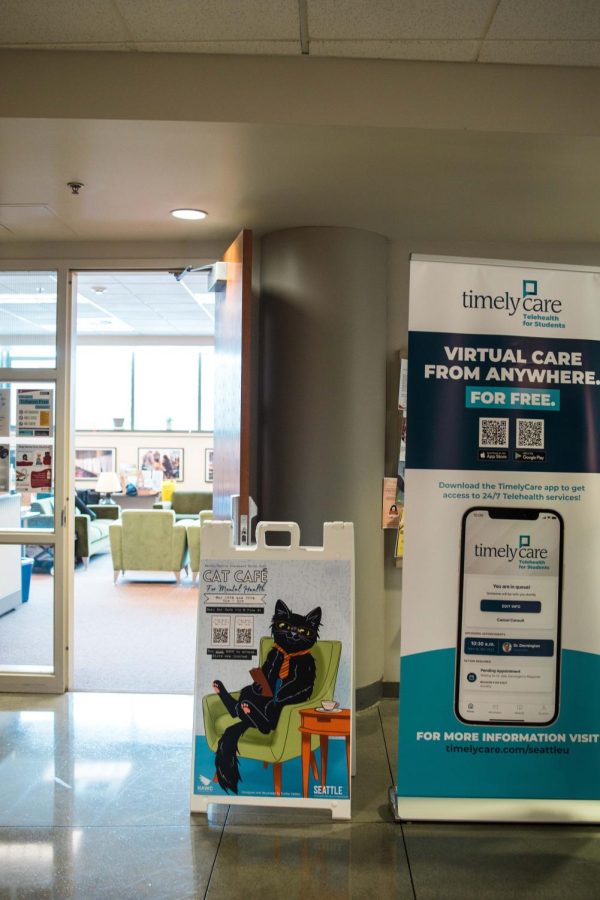Seattle U Students Continue to Push for Increased Mental Health Care
Health & Wellness office
In the past several years, the combined effects of the COVID-19 pandemic, increasing cost of living and tuition and political upheaval has begun to reveal the state of the U.S.’s collective mental health in our country. In young adults especially, rates of anxiety and depression are steadily growing, begging the question: Do universities need to be doing more?
After a mental health fundraising post on the Seattle University Instagram page late February caused backlash from students, pressure increased for staff to take strides towards improving mental health care on campus.
The post, which encouraged donations in the name of “unlocking crucial and lifesaving mental health services for students,” sparked frustration over the wording of the post and launched a conversation about mental health support at the university.
While many students appreciate the aspects of the college experience that push them out of their comfort zones, students have felt a lack of support from their universities. Seattle U offers various mental health resources for students to access, but some students feel it is not enough.
Madi Oswalt, a first-year majoring in journalism, remarked on the importance of mental health services being provided to college students.
“I feel like especially in college, it’s important because everyone is going through changes in their life, trying to be independent and figure out who they are apart from their family,” Oswalt said.
Having a support system can be integral to having a positive college experience. This includes having friends students can rely on, trusted professors or role models, physical health support and, of course, mental health care to help manage the stress of college.
Ivy Frisbee, a second-year pre-nursing student, remarked on the particular importance of mental health resources for students who lack familial support.
“I think it is imperative that schools have an adequate mental health program because it is a vital part of a student’s health, especially for kids who may not have a good support system in general and while they are away from home,” Frisbee said.
As we collectively emerge from the isolation of the pandemic and are being given space to focus on other aspects of life, aside from physical wellbeing, many are starting to recognize the toll that a multi-year long pandemic has had on their mental health.
Students throughout the U.S. feel that a significant chunk of their college experience was missed. Lauren Lainez, a second-year communications major, feels that Seattle U could be doing more for students’ mental health.
“I feel like my parents are paying a lot of money already for me to go to school here and that they should be able to provide better mental health services,” Lainez said.
Frisbee echoed the importance of providing mental health care, especially as country wide COVID-19 cases point towards the end of the pandemic.
“I think mental health services are important especially for college students and especially dealing with the aftermath of COVID-19,” Frisbee said.
In late March, Seattle U launched TimelyCare in an effort to increase support for student well-being, with some specific features centered on mental health support. TimelyCare is described as “the only student-first telehealth provider that offers a complete care solution.” The provider offers several services, including 24/7 access to talk with a mental health professional, scheduled counseling and health coaching.
So far, the reviews are mixed.
Lee acknowledged the ease of making an appointment with a therapist, but feels this change is not enough.
“It’s really easy because there are a bunch of different people. There’s some that specialize in depression or anxiety or trauma,” Lee said.
While the usability of TimelyCare received positive reviews, the limited offerings of therapy sessions frustrated several students.
“It feels like a band-aid to appease people,” Lee said. “It does kind of suck because there are only 12 appointments per year. That’s about one a month, which doesn’t seem like enough.”
Amanda Taylor, a first-year double majoring in psychology and communications, said seeing more outreach regarding mental health services would be beneficial for all Seattle U students.
“I wish there was more outreach and accessibility to students with information on exactly what Seattle U offers in terms of mental health assistance,” Taylor said.
Oswalt agreed with Taylor’s sentiment, believing that students may feel alone when they aren’t and shouldn’t feel that way.
“I feel like it would help students feel like they’re not the only ones. With mental health, it’s not talked about as much. It’s easy to act like you’re doing fine, but I feel like a lot of students are actually struggling,” Oswalt said.
TimelyCare signified a significant expansion of mental healthcare access at Seattle U, given that it allows for 24/7 access to professional counseling. However, student advocates continue to see ways for coverage to become more regular and sustained.
Natalie Neumeier, a second-year political science student, recommended a few changes the school could implement.
“I believe that if we begin to offer more services, it should be in the opinion of students. Conduct surveys or polls. Change your services for the needs of services, not compensation,” Neumeier said.
Overall, students have expressed appreciation at the changes Seattle U has made over the past several months—but they don’t believe it should stop there. Everyone agrees: Increased options, open conversations, outreach and support for all students is essential to creating a supportive mental health community on campus.











